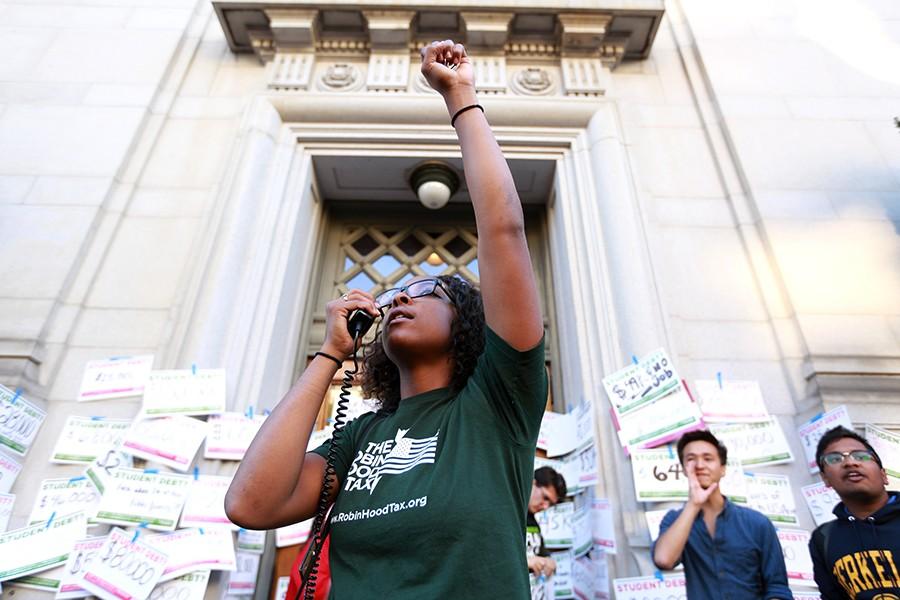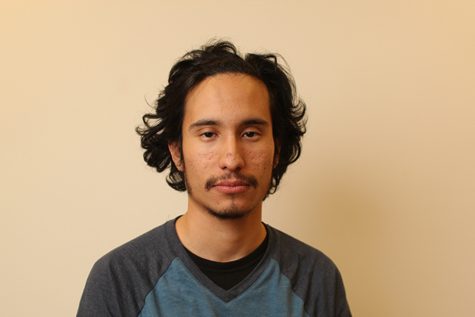March to end debt joins nationwide protest
Free tuition, $15 per hour wage highlight student demands in solidarity with day of action aimed at taxing Wall Street business interests
Nov 18, 2015
BERKELEY — Students advocating for tuition-free education, cancellation of all student debt and a $15 per hour campuswide minimum wage were met with strong backing at Sproul Plaza on the campus of UC Berkeley on a nationwide day of protest Thursday.
The planned advocacy and protests were part of the Million Student March, a nationwide day of action, where students at four-year universities around the country called for three key demands and promoted new legislation aimed at eliminating student debt and taxing Wall Street corporate interests.
“We have to resist the idea that abolishing tuition is radical,” Lauren Butler, one of the lead organizers of the protest and a UC Berkeley senior said.
Butler talked about the concept of normalizing free college education during her speech to crowd members that included National Nurses United coalition members and Cal students.
Protestors and speakers gathered in front of Sproul Hall near the corner of Telegraph and Bancroft avenues at 2 p.m. where they gave speeches and carried signs showing their own respective student debt. The students then marched to California Hall, an administrative building.
From there, dozens of protesting students placed their signs on and around the building, creating a symbolic wall of debt that many of them believe belongs to the UC administrators and the U.S. government.
Yashmeen Ahmed, organizing director for the Associated Students Union of University of California, said students wanted to create a sense of shame for institutions like UC Berkeley for complying with corporate greed of Wall Street and raising tuition by placing signs on the building.
According to Butler, college graduates leave UC Berkeley with an average debt of $30,000, mostly from rising tuition rates in 2014.
“Why is it radical when tuition didn’t even exist 50 years ago,” she said referring to the California Master Plan of 1960 for Higher Education, which reaffirmed the state’s prior commitment to the principle of tuition-free education for in-state residents.
Butler said, “Legislation like the (California Master Plan) once existed and it protected our education as a right. So we must not trick ourselves into believing that we are fighting an impossible fight or that we asking for something that is too big because we are not.”
Organizers and participants of the Million Student March movement, including those here on Thursday, wanted those on hand to understand and promote the College for All Act, a bill introduced by current Democratic presidential candidate Sen. Bernie Sanders of Vermont.
The legislation would provide $47 billion per year to states to eliminate undergraduate tuition and fees at public colleges and universities.
It lists reforms for student loans, work study, a simplified student aid application process and is fully funded by what is known as a Robin Hood tax on Wall Street.
The Robin Hood tax would impose fees on investment firms, hedge funds and others by 0.5 percent on stock trades, 0.1 percent on bonds and a 0.005 percent on derivatives. The estimates are that this provision could raise hundreds of billions of dollars a year, enabling student tuition costs to be waived.
Butler said, “What we are doing is reclaiming our education. The young people of this country are not going to sit back silently and watch as Wall Street infiltrates our educational system.
“Our education has been devalued by this government to the level of a commodity to be gambled with by the one percent.”
Katy Roemer, a nurse at Kaiser Permanente in Oakland, said she incurred a significant amount of debt to attend nursing school and continued to pay for it for more than 20 years.
Roemer, a member of the California Nurses Association, said, “My son’s (tuition) is more than $33,000 each year and he’s going to have to pay it off for the next 20 years like I did.”



